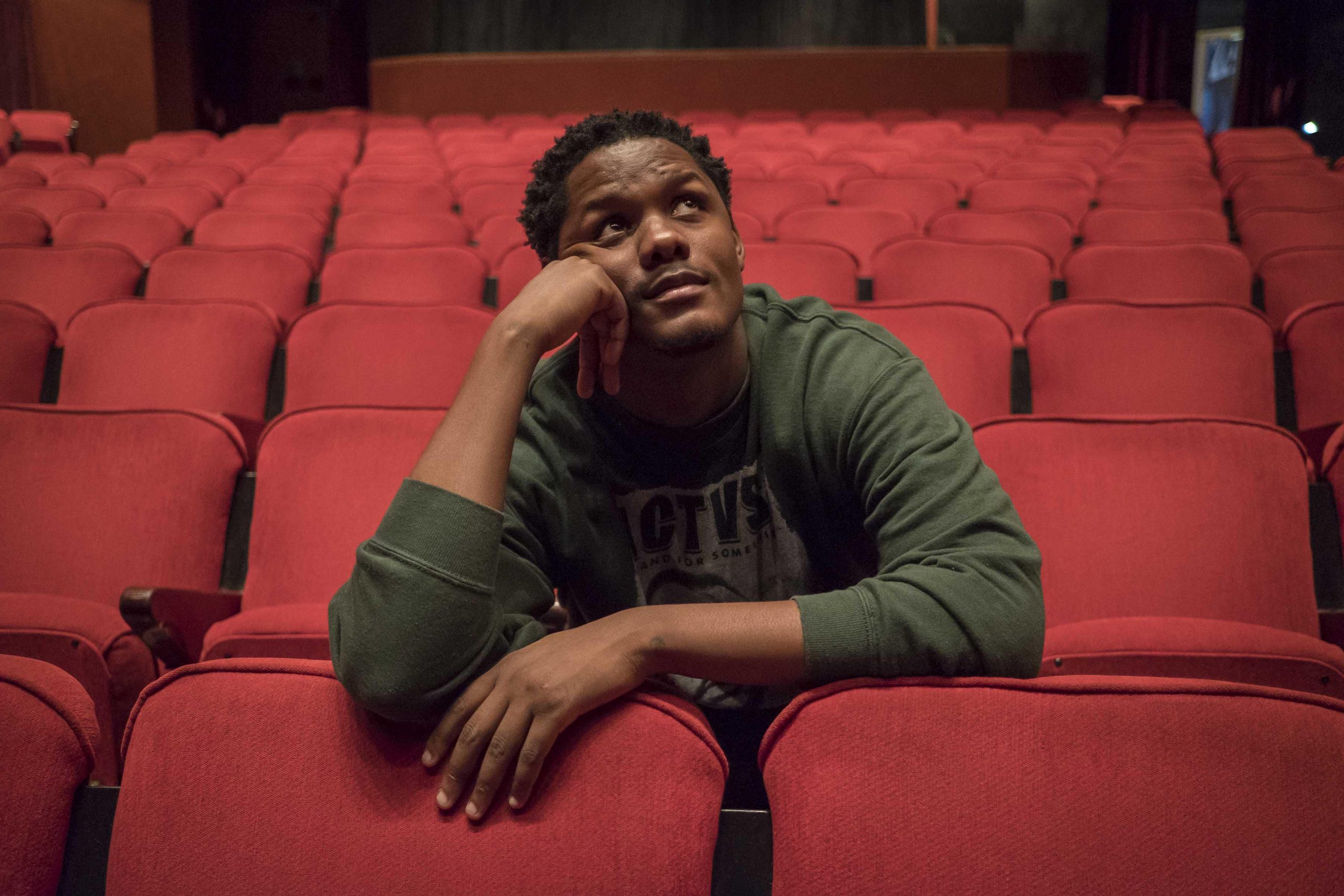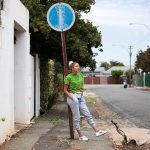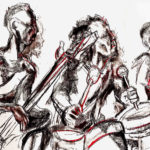Samthing Soweto harmonises with history
Samkelo Mdolomba has refined his vocal talent over time, drawing on past life and musical experiences to hone his unique sound.
Author:
20 February 2019

Muffled over what sounds like the percussive beat of a quietened xylophone slat, Samkelo Mdolomba gently croons:
Awudlal’ ingoma ndoda emnyama
Awudlal’ ingoma ndoda emnyama
Ngoba naba abantu, naba baningi bakulindile
A moment passes and the words sung by Mdolomba become more audible as he repeats them on the opening track of DJ Black Coffee’s 2018 EP, Music is King.
The track on which he features is called Ndod’emnyama.
The lyrics of the song loosely translate into a call for a black man to play the song for which the crowd has been waiting. Mdolomba sings the words with a quiet and knowing reverence over the backbeat, perhaps because it is a scene with which he has become intimately familiar.
Having fielded requests from audiences across the country for hits such as Akanamali, his collaboration with Sun-El, Abantu, on which he features with Mobi Dixon, and Ndofire/Skado, Mdolomba is sensitive to the communal role performers play.
A capella and communal influences
Known as Samthing Soweto to his fans, the 31 year old has always understood the inclusion of a variety of musical traditions in his work to be a nod to a collectivised sense of music-making.
He speaks about how his experiences playing with various groups have influenced and shaped his trajectory as a vocalist, bringing him to what is now his distinct sound. “Look, for me it’s been a long time coming and I’ve taken a long path to where I am now,” he says, sitting on a small stool in the foyer of the Joburg Theatre. He has a picture of American civil rights leader Martin Luther King Jr printed on his sweater.
Mdolomba started off in 2011 with popular a capella group The Soil. There were four of them in the group: Buhlebendalo Mda, Ntsika Ngxanga, Luphindo Ngxanga and Mdolomba. Soon after the release of their self-titled album, Mdolomba left the group and joined The Fridge, a Joburg-based neo jazz band, with Adebayo Omotade and Mothusi Thusi.
“Having my background in a capella through The Soil gave me some time to explore and to find out how far I could push a vocal performance, in recording and in performance, to get people excited.”
Related article:
Mdolomba has been preoccupied with the need to experiment with established melodies and sounds for a while. His 2014 EP, Eb’suku, with its silver-toned riffs and delicate vibrato, shows a willingness to experiment with tone and inflection.
“I started with the basic sound of The Soil, basic in the sense that I further continued and experimented with the sound in my mind in Eb’suku. I wanted to push that sound forward and make it more artistic and find more within that sound.”
Mdolomba tells how he would drop a “track or two” each year in an attempt to hone in on this idea and further explore the musical sensibilities in the various a capella genres he had encountered.
I don’t know if everyone knows,” he says “but that music that The Soil does is based off of old music and an old way of doing a capella music.
“I actually learnt that when I was arrested and I went to what we call ‘juvie’. Funnily enough, the facility was run by the now infamous Bosasa in Krugersdorp. They called it Dyambu.”
Prison music
He recalls his two-month spell as a 16 year old at the Bosasa-Dyambu Youth Centre as an experience that changed him forever. He was found guilty of and detained for armed robbery.
Mdolomba received a suspended sentence shortly thereafter, however, as he was a first-time offender. His criminal record has since been expunged and he has said previously that his community forgave him and supported him.
But during his time at the youth centre, Mdolomba was exposed to the earliest iterations of what became the basis of his own contemporary music.
Related article:
“There’s this thing in Soweto that we call gumba fire, in other places they call it igwiji.” After a short pause, he clarifies: “It’s prison music, basically. It’s prison a capella music.
“Instead of the music being all grimy and talking about crime and stuff, a lot of the songs had Nthabiseng as its subject,” he laughs, referring to the themes of romance often found in the genre. “You would be surprised as to how many songs actually speak of Nthabiseng!”
The Nthabiseng he is referring to is a representative of the fictive female protagonist to whom these songs are addressed. The men singing these songs woo and declare their love for their imagined subject.
Mdolomba notes, however, that not all of the songs sung in prison were an expression of romantic love. “So, instead of songs focusing on Nthabiseng or umama ka Nthabiseng, it was important to also make it more relatable. Like, um, like talking about God. The fact that I was starting to see the value in being Christian at the time really worked for me.”
He adds profoundly, “Criminality doesn’t strip you off your humanity. I mean we were singing about love and spirituality in prison.”
Developing and crafting his musicianship
Mdolomba says the last stretch of his high school years was formative in developing his rigorous relationship with craft and technique. He remembers using the gospel themes he had familiarised himself with in prison to start thinking about his own sound.
“I was lucky enough to pair up with the best singers in high school when I came out [of the youth centre]. It was only two and a half months really, but it was enough to change my life.”
Mdolomba continued his formal education at Tetelo Secondary School in Pretoria North after having dropped out of school in grade 8. This is where he met the trio that would later become The Soil and introduced them to his work as a singer and newly formed composer of a capella music.
Related article:
“I was two years late by then, after having repeated grade 3 and dropping out in grade 8, which meant that although they were my seniors, we were the same age,” he remembers, a tinge of despondence in his tone.
A significant amount of time and experience has shifted Molombo’s outlook since his late adolescence and transition into his early 20s.
“Since then, I have tried for simplicity in my music. The message needs to hit you as soon as you hear it and the story needs to be relatable. The reason for this is because I have had all that time to make songs that were abstract and required some sense of [social] awareness for you to understand. That, of course, has its place. But it didn’t really appeal to the commercial sense.”
The business of love
With songs such as Ndofire/Skado and Ubhukhazikhazi Balentombi, Mdolomba reflects on the significance of love songs in his music.
“For me, when I talk about life in my music and all those things, the anchor with that is love. I can talk about how tough things are and then I return to love. Love is a great medium to talk about, or to express deep emotion.”
Mdolomba says “it is the most accessible and most viable way if you want to talk about which songs make the most money.
Related article:
“To be honest, I think about that,” he adds frankly.
“I have to think about [it] because at the end of the day, if you are going to have people around helping you, those people will have to make a living. If I am the source, then I have to consider those things. If not, then I can sing about whatever I want and chill in my room or at my mom’s place.”
Samthing Soweto performs at the Joburg Theatre on 22 and 23 February. Tickets are available on www.joburgtheatre.com.




